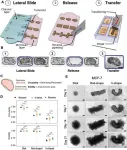(Press-News.org) A new study by heart researchers at Intermountain Health in Salt Lake City finds that patients with heart disease, specifically those with heart failure, are especially vulnerable to the impacts of air pollution and poor air quality and can take steps to protect themselves.
Results from the Intermountain Health study, presented on Saturday at the American Heart Association’s 2024 Scientific Sessions international conference in Chicago, found that two inflammatory markers — CCL27 (C-C motif chemokine ligand 27) and IL-18 (interleukin 18) — were elevated in heart failure patients who were exposed to poor air quality, but did not change in those without heart disease.
This indicates that such air pollution events put more strain on the bodies of patients who already have heart problems.
While previous research has shown that people with some chronic health conditions, like heart failure, coronary disease, asthma, and COPD, struggle during spikes in air pollution, the new Intermountain Health study demonstrates that cardiac inflammation levels specifically rise in people with heart disease during periods of poor air quality.
“These biomarkers rose in response to air pollution in people who already had heart disease, but not in patients who were heart disease free, showing that heart failure patients are not as able to adapt to changes in the environment,” said Benjamin Horne, PhD, principal investigator of the study and professor of research at Intermountain Health.
For the retrospective study, Intermountain Health researchers worked with scientists at Stanford University and the Harvard School of Public Health to examine the blood of patients enrolled in the Intermountain INSPIRE registry, which collects blood and other biological samples, medical information and laboratory data from healthy individuals and those who have been diagnosed with a variety of medical conditions.
Researchers specifically looked at blood tests for 115 different proteins that are signs of increased inflammation in the body.
They then examined blood draws of 44 patients with heart failure with preserved ejection fraction, and 35 people without heart disease. Some blood was drawn on days with low air pollution, where ambient PM2.5 levels were under 7 micrograms per cubic meter (μg/m3) of air; those test results were compared to draws done in other people on days when air pollution spiked to PM2.5 levels of 20 μg/m3 or over.
These spikes were caused by either wildfire smoke in the summer, or during a winter inversion, where air pollution is trapped when warm air holds pollution closer to the ground.
Researchers found that two inflammatory markers — CCL27 and IL-18 — were elevated in heart failure patients, but did not change in those without heart disease, indicating that such air pollution events put more strain on the bodies of patients who already have heart problems.
These findings “give us some information about mechanisms in people with heart failure who are having inflammation and suggest they’re not as capable in responding to acute inflammation as people who are healthy,” said Dr. Horne.
He added that the results from the study suggest that heart failure patients need to take extra precautions during times when air pollution is high.
“It’s important that individuals with known heart disease, including those diagnosed with heart failure, need to be especially cautious during periods of poor air quality. This includes exercising indoors, making sure to take their prescribed medications, and avoiding areas like roadways and highways where there’s a lot more traffic and pollution,” he said.
###
END
New study finds air pollution increases inflammation primarily in patients with heart disease
2024-11-16
ELSE PRESS RELEASES FROM THIS DATE:
AI finds undiagnosed liver disease in early stages
2024-11-16
SAN DIEGO, California (Nov. 16, 2024) — Liver disease, which is treatable when discovered early, often goes undetected until late stages, but a new study revealed that an algorithm fueled by artificial intelligence can accurately detect early-stage metabolic-associated steatotic liver disease (MASLD) by using electronic health records. The study was scheduled for presentation today at The Liver Meeting, hosted by the American Association for the Study of Liver Diseases.
“A significant proportion of patients who meet criteria for MASLD go undiagnosed,” said Ariana Stuart MD, a resident at University of Washington Internal Medicine ...
The American Society of Tropical Medicine and Hygiene and the Bill & Melinda Gates Foundation announce new research fellowship in malaria genomics in honor of professor Dominic Kwiatkowski
2024-11-16
The American Society of Tropical Medicine and Hygiene and the Bill & Melinda Gates Foundation Announce New Research Fellowship in Malaria Genomics in Honor of Professor Dominic Kwiatkowski
New Orleans, Louisiana, November 15, 2024 — The American Society of Tropical Medicine and Hygiene (ASTMH) is proud to announce the establishment of the annual Kwiatkowski Fellowship, a new research initiative in partnership with the Bill & Melinda Gates Foundation (BMGF). This fellowship honors the life and scientific contributions of the late Professor Dominic Kwiatkowski, a pioneer in the field of malaria genomics.
The ...
Excessive screen time linked to early puberty and accelerated bone growth
2024-11-16
Exposure to blue light, like that from smartphones or tablets, may accelerate bone growth and bone age, leading to early puberty in rats. This research, presented at the 62nd Annual European Society for Paediatric Endocrinology Meeting in Liverpool, sheds light on how the use of blue light-emitting devices could impact growth and development and raises important questions about the long-term health effects in children, who are increasingly exposed to screens from a young age.
As children grow and develop, long bones such ...
First nationwide study discovers link between delayed puberty in boys and increased hospital visits
2024-11-16
Swedish young men who went through late puberty during adolescence are more likely to use healthcare services later in life, according to research presented at the 62nd Annual European Society for Paediatric Endocrinology Meeting in Liverpool. The findings of this long-term study suggest that delayed puberty in boys may have harmful effects on their health in adulthood and could potentially lead to new follow-up healthcare routines in the future.
Puberty in boys typically starts between the ages of 9 and 14. However, about 2% of boys have delayed puberty, in which puberty does not begin by age 14. In most cases, delayed puberty is constitutional – a pattern of growth and development ...
Traditional Mayan practices have long promoted unique levels of family harmony. But what effect is globalization having?
2024-11-16
A new paper in the journal Child Development shows how some aspects of family interaction among Indigenous people in Guatemala have fundamentally shifted with rapid globalization, yet families have still maintained a unique level of harmony in their interactions.
UC Santa Cruz psychologist Barbara Rogoff has been working with Mayan communities in San Pedro la Laguna, Guatemala for five decades and noticed a sophisticated type of fluid, inclusive collaboration among children from these communities. During a research study 30 years ago, mothers and their two small children interacted in a very distinct way, ...
New microfluidic device reveals how the shape of a tumour can predict a cancer’s aggressiveness
2024-11-15
Researchers at the University of Toronto’s Faculty of Applied Science & Engineering have designed a new microfluidic platform that allows forunprecedented control and manipulation of tumor shapes — a largely unexplored area with great potential to advance cancer research.
The work, led by Professor Edmond Young, offers new insights into how the shape of tumours can predict cancer cell behaviour and aggressiveness, which opens new pathways for more personalized and targeted cancer care.
“While there are several platforms for in vitro modelling of spheroids — ...
Speech Accessibility Project partners with The Matthew Foundation, Massachusetts Down Syndrome Congress
2024-11-15
The Speech Accessibility Project has two new partners — The Matthew Foundation and the Massachusetts Down Syndrome Congress — as it continues to recruit adults with Down syndrome who live in the United States and Canada. The project also allows residents of Puerto Rico to participate.
The project is also recruiting those with ALS, cerebral palsy and Parkinson’s disease, as well as individuals who have had a stroke.
“The research team has learned that connecting with trusted partners is key to showing the credibility of our work and how much it could improve the lives of people with disabilities,” said Mark ...
Mass General Brigham researchers find too much sitting hurts the heart
2024-11-15
Fitting in a workout after a long day of sitting at a desk might not be enough to compensate for the impacts of sedentary behavior on the heart. Investigators from Mass General Brigham, found that excessive sedentary behavior (waking activity with low energy expenditure while sitting, reclining, or lying down and not including hours spent sleeping at night) was linked to increased risk of heart disease, especially heart failure and cardiovascular death, and that these risks could be significantly reduced by substituting sedentary time for other activities. They also found that meeting guideline levels of moderate-to-vigorous physical activity may be insufficient on its own to reduce cardiovascular ...
New study shows how salmonella tricks gut defenses to cause infection
2024-11-15
A new UC Davis Health study has uncovered how Salmonella bacteria, a major cause of food poisoning, can invade the gut even when protective bacteria are present. The research, published in the Proceedings of the National Academy of Sciences, explains how the pathogen tricks the gut environment to escape the body's natural defenses.
The digestive system is home to trillions of bacteria, many of which produce short-chain fatty acids (SCFAs) that help fight harmful pathogens. But Salmonella manages to grow and spread in the gut, even though ...
Study challenges assumptions about how tuberculosis bacteria grow
2024-11-15
The rod-shaped tuberculosis (TB) bacterium, which the World Health Organization has once again ranked as the top infectious disease killer globally, is the first single-celled organism ever observed to maintain a consistent growth rate throughout its life cycle. These findings, reported by Tufts University School of Medicine researchers on November 15 in the journal Nature Microbiology, overturn core beliefs of bacterial cell biology and hint at why the deadly pathogen so readily outmaneuvers our immune system and antibiotics.
"The ...

